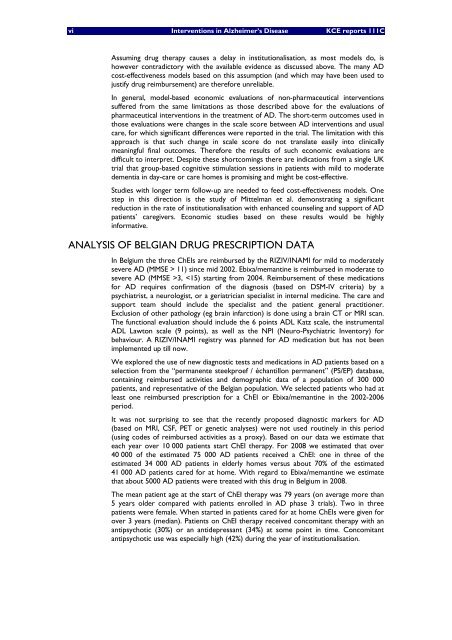Download the full report (112 p.) - KCE
Download the full report (112 p.) - KCE
Download the full report (112 p.) - KCE
Create successful ePaper yourself
Turn your PDF publications into a flip-book with our unique Google optimized e-Paper software.
vi Interventions in Alzheimer’s Disease <strong>KCE</strong> <strong>report</strong>s 111C<br />
Assuming drug <strong>the</strong>rapy causes a delay in institutionalisation, as most models do, is<br />
however contradictory with <strong>the</strong> available evidence as discussed above. The many AD<br />
cost-effectiveness models based on this assumption (and which may have been used to<br />
justify drug reimbursement) are <strong>the</strong>refore unreliable.<br />
In general, model-based economic evaluations of non-pharmaceutical interventions<br />
suffered from <strong>the</strong> same limitations as those described above for <strong>the</strong> evaluations of<br />
pharmaceutical interventions in <strong>the</strong> treatment of AD. The short-term outcomes used in<br />
those evaluations were changes in <strong>the</strong> scale score between AD interventions and usual<br />
care, for which significant differences were <strong>report</strong>ed in <strong>the</strong> trial. The limitation with this<br />
approach is that such change in scale score do not translate easily into clinically<br />
meaningful final outcomes. Therefore <strong>the</strong> results of such economic evaluations are<br />
difficult to interpret. Despite <strong>the</strong>se shortcomings <strong>the</strong>re are indications from a single UK<br />
trial that group-based cognitive stimulation sessions in patients with mild to moderate<br />
dementia in day-care or care homes is promising and might be cost-effective.<br />
Studies with longer term follow-up are needed to feed cost-effectiveness models. One<br />
step in this direction is <strong>the</strong> study of Mittelman et al. demonstrating a significant<br />
reduction in <strong>the</strong> rate of institutionalisation with enhanced counseling and support of AD<br />
patients’ caregivers. Economic studies based on <strong>the</strong>se results would be highly<br />
informative.<br />
ANALYSIS OF BELGIAN DRUG PRESCRIPTION DATA<br />
In Belgium <strong>the</strong> three ChEIs are reimbursed by <strong>the</strong> RIZIV/INAMI for mild to moderately<br />
severe AD (MMSE > 11) since mid 2002. Ebixa/memantine is reimbursed in moderate to<br />
severe AD (MMSE >3,

















